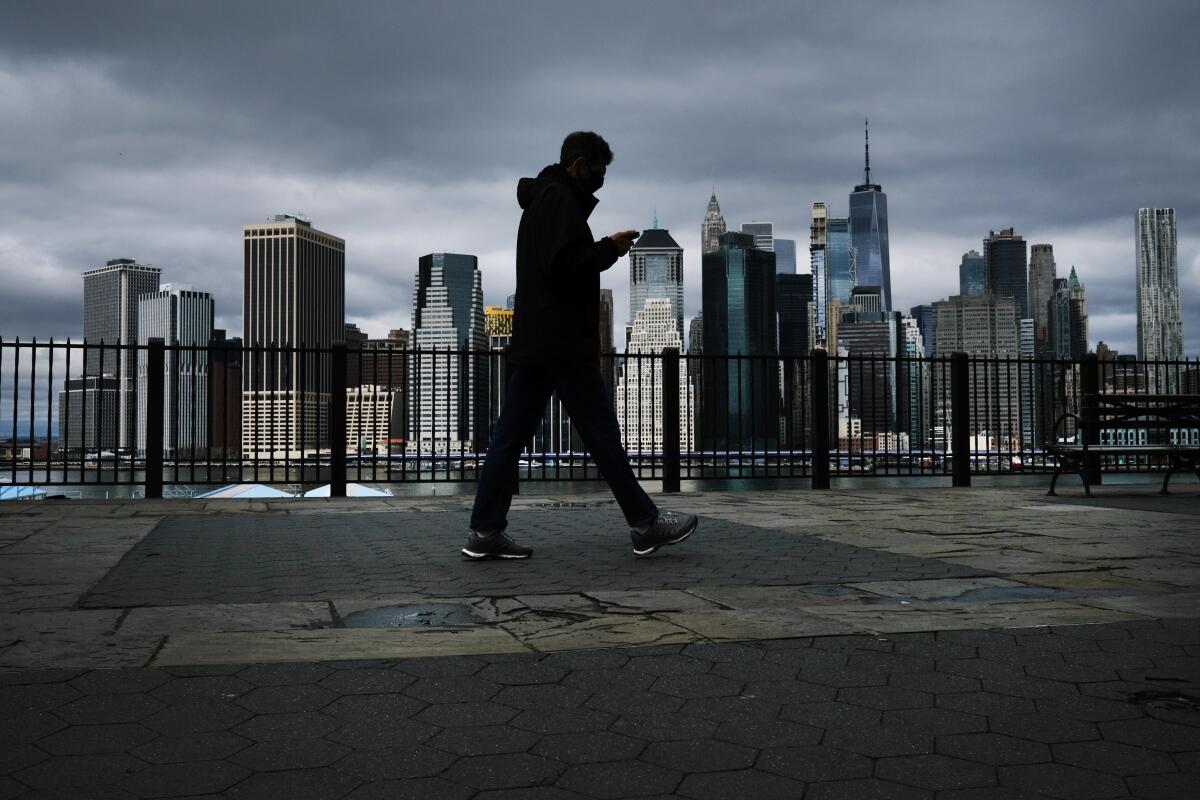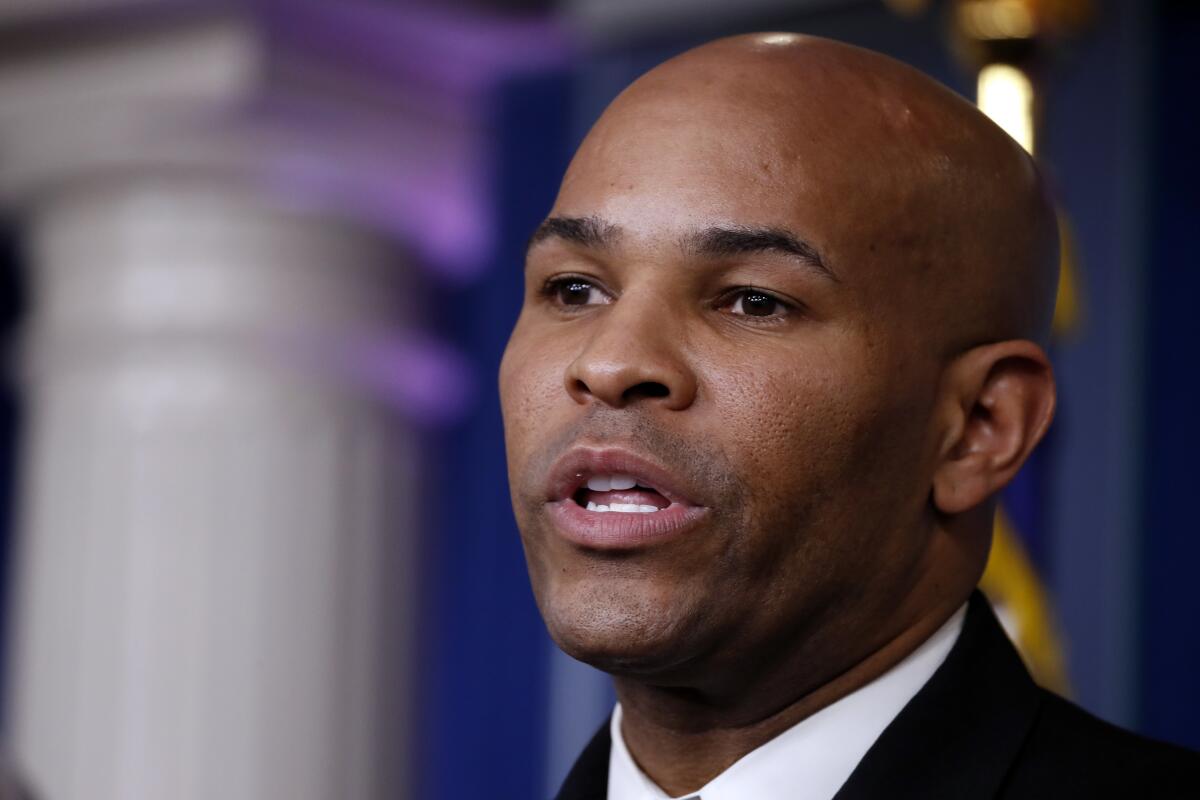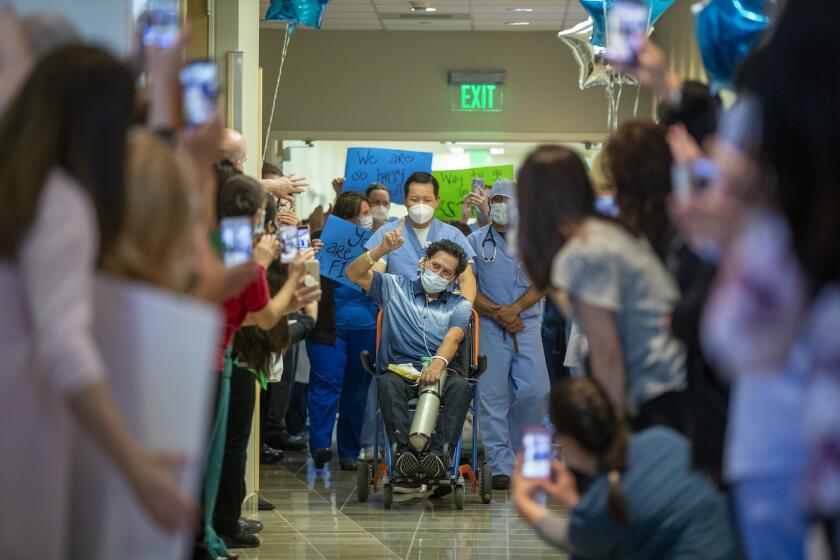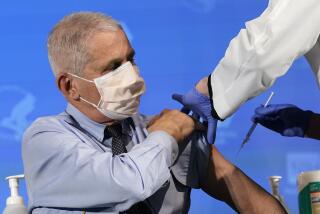‘Hardest, saddest’ days ahead in coronavirus outbreak, surgeon general warns

- Share via
WASHINGTON — As the U.S. coronavirus death toll neared 10,000 on Sunday, Surgeon Gen. Jerome Adams said the coming week would be “the hardest and saddest of most Americans’ lives,” likening the projected loss of life to “our Pearl Harbor moment, our 9/11 moment.”
Joining in that somber assessment was Dr. Anthony Fauci, the government’s top infectious disease expert, who predicted that the dimensions of the outbreak would be “shocking to some” over the next eight or nine days.
“Things are going to get bad, and we need to be prepared for that,” Fauci, perhaps the best-known member of the White House coronavirus task force, said on CBS’ “Face the Nation.”
He called on the country to “just buckle down, continue to mitigate, continue to do the physical separation, because we’ve got to get through this week that’s coming up.”
President Trump, however, largely eschewed talk of dire coming days, instead expressing hopes for a “leveling-off in the hottest spots” of infection. Brushing aside criticism of his administration’s performance, he said in an early-evening briefing that he was making use of “the full power of the American government.”
“We’re orchestrating a massive federal response, unlike anything our country has ever done,” he said, later adding: “We’re starting to see light at the end of the tunnel.”
Earlier Sunday, officials offered hope that in some areas hit hard and early, the coronavirus wave may be cresting. New York City is the national epicenter of the outbreak, its medical system staggering under a critical caseload, but Gov. Andrew Cuomo said the state’s daily death toll had dropped slightly.
Even so, Cuomo, who has been praised for steady leadership amid the crisis, said at a briefing in his state’s capital, Albany, that it was too soon to know if the slight easing marked a downward trend or was merely a “blip.”
Flare-ups of COVID-19, the disease caused by the novel coronavirus, were in evidence elsewhere in the country — in New Jersey, across the river from Manhattan, and in Louisiana, whose governor warned that ventilator capacity would soon be exhausted.
In Europe, the picture was mixed. Deaths were still climbing in the United Kingdom, where Prime Minister Boris Johnson, whose COVID-19 diagnosis was announced March 26, was hospitalized Sunday. Trump expressed hopes for his recovery, saying Johnson was “strong.”
But Italy — the European epicenter — said Sunday that its daily toll was at a two-week low, with officials crediting strict lockdowns for seemingly slowing the progress of new infections. Hard-hit Spain, too, reported signs of a leveling-off.
U.S. officials pleaded for public cooperation in hopes of replicating that pattern.

“We can look like that,” said Dr. Deborah Birx, the coronavirus task force coordinator. Referring to strict isolation measures in Spain and Italy, she said: “The promise is, if we do this, we could potentially be better.”
Adams, appearing on “Fox News Sunday,” urged Americans to follow physical distancing guidelines and to wear face coverings in public when it would be difficult to remain six feet apart. The Centers for Disease Control and Prevention last week called on Americans to wear masks in crowded public places. Trump said Friday of that precaution: “I don’t see it for myself.”
The surgeon general, like many in the president’s orbit, was at pains to avoid publicly contradicting or criticizing him. “The president is making a choice that is appropriate for him” regarding masks, said Adams, who last week released a video showing how to make a simple homemade face covering with fabric and rubber bands.
Adams also deflected questions about the need for a nationwide stay-at-home order. Trump has said he prefers to leave the decision to governors, nine of whom have not issued such a directive in their states.
Governors, for their part, renewed their pleas for more federal help in procuring necessary medical supplies and equipment. In appearances on news talk shows, some sharply contested Trump’s casting of blame on states for a lack of readiness.
These are some of the unusual new scenes across the Southland during the coronavirus outbreak.
Washington state Gov. Jay Inslee, appearing on NBC’s “Meet the Press,” cited good communication with Vice President Mike Pence and the CDC, but said the overall lack of national coordination in fighting the outbreak had been “ludicrous.”
Without mentioning Trump by name, he blasted the president’s contention that the federal government was meant to serve as a “backup” for states’ efforts to obtain needed supplies.
“I mean, the surgeon general alluded to Pearl Harbor,” said Inslee, a Democrat. “Can you imagine if Franklin Delano Roosevelt said, ‘I’ll be right behind you, Connecticut. Good luck building those battleships.’ Look, we need a national mobilization of the manufacturing base of the United States.”
Michigan Gov. Gretchen Whitmer, another Democrat who has, like Inslee, been the target of heated personal attacks by Trump, said Sunday that more robust testing efforts were needed to help public health experts tamp down scattered outbreaks before they become major conflagrations.
“My job is to do everything I can to protect the 10 million people of Michigan,” she said on “Fox News Sunday,” noting a worrying rate of COVID-19 cases in Detroit, the state’s largest city. “Michigan is a hot spot; we need assistance, and I’m grateful for any partnership at the federal level.”
Louisiana Gov. John Bel Edwards said his state was running out of ventilators and hospital beds, as New Orleans weathers one of the nation’s worst outbreaks.
“We now think it’s probably around the 9th of April before we exceed our ventilator capacity, based on the current number on hand,” he said on CNN’s “State of the Union.” Edwards also said the state was “a couple days behind that on [intensive care unit] bed capacity being exceeded.”
Some GOP governors who have avoided criticizing Trump or the federal response nonetheless cited worsening situations in their states. Arkansas Gov. Asa Hutchinson pointed to the challenges of procuring personal protective equipment for medical personnel.
“It’s difficult,” he said on NBC’s “Meet the Press,” saying Arkansas had sometimes been “outbid by another state after we’ve had the order confirmed.”
He added: “It literally is a global jungle that we’re competing in now.”
While upending daily lives and livelihoods across the country, the pandemic has also disrupted the 2020 election cycle. Former Vice President Joe Biden, who appears likely to clinch the Democratic presidential nomination, on Sunday floated the idea of a “virtual” convention rather than a traditional one.
The party had already pushed back the date for anointing its nominee to mid-August from mid-July over pandemic fears. Speaking on ABC’s “This Week,” Biden suggested that the event might need to be moved online.
“I think we should be thinking about that right now,” he said. “We may not be able to put 10[ thousand], 20[ thousand], 30,000 people in one place.”
The former vice president also said he intends to follow CDC guidelines and cover his face in public, for as long as that recommendation remains in place. Of Trump’s balking at that, he said: “He may not like how he looks in a mask.”
Projecting the course of the outbreak is difficult to do, experts said, because much depends on the measures being taken now and in days and weeks ahead.
Fauci, who heads the National Institute of Allergy and Infectious Diseases, said in his CBS interview that it would be false to say the outbreak is under control, even if there are glimmers of hope on the horizon.
“We are struggling to get it under control, and that’s the issue that’s at hand right now,” he said.
During Trump’s rambling 90-minute briefing, he repeatedly touted an unproven drug treatment, hydroxychloroquine, and cut off a journalist’s attempt to ask Fauci about it. Fauci has previously expressed more skepticism about the treatment.
More to Read
Sign up for Essential California
The most important California stories and recommendations in your inbox every morning.
You may occasionally receive promotional content from the Los Angeles Times.











